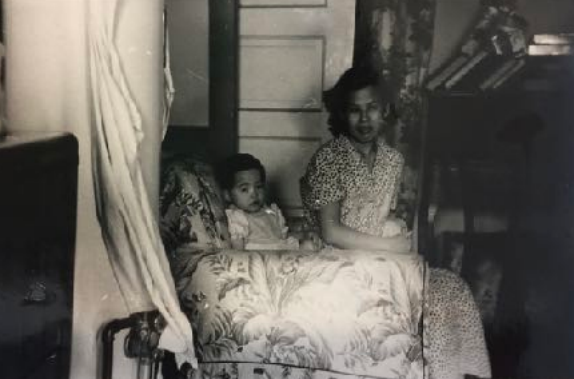
by Cynthia Yee
RRRrrrr…rrrr… The humming came from the top of the summit, rrrrrrrrRRrrrrrr…. rrrrrrr… rrrrr…, the soundtrack of my seven years of life, MaMa’s constant heartbeat, MaMa’s sweet lullaby, MaMa’s comfort song, trailing down, calling me home.
I faced the wide, wooden bannister, worn shiny and smooth, perfect for mounting and gliding down. The gleaming waterfall cascaded down, ending in a large flat curl, a glistening pool, a splash, a forever and ever promise of an exhilarating, soft, safe landing. I placed my right foot onto the incline, skipped up two steps, and then two more, propelling myself up the long, steep incline faster and faster, two steps at a time. I delighted in speed, flying through hollow air, the freedom of a comet in Space.
I passed the empty glass milk bottles, goddesses shimmering in the arched grotto carved into the wall. I stopped and bowed three deep bows. I continued on . At the end of the passageway, I spied three oil canisters, soldiers standing guard, with oily rags draped around their necks. I saluted them. I followed the call of the siren, the never ending …. rrrrrr. With a gentle nudge, then a swift kick , the magic door opened. I slid in, onto the shiny maroon and gray paisley swirls. I looked for MaMa.
I found her sitting over her Singer sewing machine, in intense concentration. She did not turn around to greet me. I looked at her curved back, the most familiar part of MaMa’s body. The Singer machine faced the window where she could see the dirty milk sky, if she looked up, but she seldom did. I looked out the living room window next to her and watched the trucks and cars rumbling by on the Southeast Expressway.
I told MaMa about my school day, how my second grade teacher had brown spots on her arms, how she draped an animal around her shoulders, and how the animal had eyes that popped out of its head, staring at me. I told her about how the teacher heated up thick, yellow soup from a can on the radiator, and how her upper arms jiggled when she washed her hands, and how she didn’t rinse her hands well, but just dried them with a paper towel. Without looking up or interrupting a beat in her pedaling, MaMa said, “Lo-Fans are like that. They eat canned food and they grow brown spots on their skin. Not like us. We eat fresh greens and fresh meat and we don’t get brown spots on our skin. “You must always rinse your hands off after soaping or the soap will pickle your skin. Lo-Fans grow from a different variety of seed. They are different from us.” I said, “How is that true? They see the same doctors as us, so they must have the same body.” She said, “U ni ge llim how sang mo ge, dik a yeh ngin koh. Keck mm hoong jung.” She was right about that. Partly right. Some Lo-Fans do have hair growing out of their chest, like Wild Men. I tried hard to imagine Miss Murphy with hair growing out of her chest. Like a Wild Woman. I saw furry-chested white men cavemen cartoons on television andthe Lo-Fan men at the nudist colony flicks at the Trans-Luxe Theatre before the Chinese opera on Friday nights, but never a furry-chested woman. They were all in black and white, so it was hard to imagine them as real. Maybe they do grow from a different variety of seed, a less advanced species, in her opinion, but I was not convinced. I liked Miss Murphy.
Sometimes, MaMa talked to me about her old life in China and about my two older sisters still there. She talked while she hung the wash on the clothesline that stretched from our living room window out to the tree in the back lot. The Tree of Heaven, it was called. She bought me coloring books and taught me how to color: “Red goes well with Green, and Orange goes well with Blue,” MaMa said. I arranged the crayons in my crayon box in that order, just so I would remember. I obeyed my MaMa in most things. I trusted her to know everything.
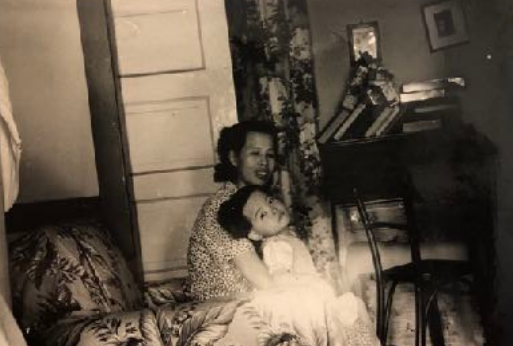
I helped MaMa with her work. I flipped collars and cuffs, folded the College Town shirts into a neat pile, and tied them together into bundles for Norman, the factory owner, to pick up. This week’s shirts had ties so I used a sharpened chopstick to turn them inside out. “Make sure the corners are pointy sharp,” she said. I poked the corners with the sharp end of the chopstick. She stepped on the pedal of the machine and the cloth slithered forward in front of her. She stopped and pedaled again. I watched her. Then I looked for some chocolate milk in the squat white refrigerator that sat behind her. It leaned against the adjoining wall in the living room. Without skipping a beat in her sewing nor turning around, she said, “Mix half white milk and half chocolate milk. Don’t drink just chocolate milk.” She didn’t have many rules but I knew this was one of her firm, not to be messed with, rules. I peered at the tall clear glass and I poured the chocolate milk to the level I judged to be the half way mark, more or less, and then poured in the white milk up to the top of the glass. I stirred it. Then I sat on the sofa chair behind her and sipped my half white, half chocolate milk. She sewed.
For variety, I sometimes cracked a raw egg into a tall clear glass and whipped the egg yolk and egg white around the glass with a spoon. I stirred clockwise, then counter clockwise, to see if it made any difference. I stirred in one, sometimes two, teaspoons of sugar and watched to see how long it took for sugar crystals to dissolve in whipped eggs. Then I filled the glass up to the top with cold milk and stirred some more. I looked at the globules of yellow yolk floating in the white milk. Egg yolk and milk did not blend, no matter how much I stirred. Without turning around nor stopping, MaMa said, “It is good for you.” I judged it for sweetness, then I drank it, especially enjoying the crunch of the undissolved sugar crystals with the rich taste of raw egg yolk. “Opera singers drank raw eggs,” she said, “It clarified their voices.” I made it often, mainly, just to look at the globules of golden yolk swirl around in the white milk and I wondered why yellow egg yolk and white milk couldn’t blend, no matter what.
Sometimes, I yodeled around the living room and sang up and down the scale, afterwards, to see if my voice got any clearer. I believed whatever MaMa said but I liked to test things out. I knew MaMa was not exactly like the American mothers I saw on TV nor like my American teachers. I had the beginning notion that MaMa was not exactly ‘“mainstream”. Entertaining two realities at the same time became my modus operandi. Testing out each reality was part of it.
She sent me to the factory on Edinboro Street, across busy Kneeland Street, to pick up spools of thread. I was then ten years old and not very tall so I stood on my toes to pull the coarse rope of the freight elevator. I found Laila, the factory owner’s wife, sewing at her machine. Her dark eyes peered at me over her black framed glasses. “Hi, honey, what do you need? Thread? What is May Soon sewing now? Here, take these home.” She handed me three spools of thread of various colors. I brought them home and handed them to MaMa. She saved the leftover spools in a large cardboard box and used the thread to sew our own clothes.
MaMa sewed until well past midnight. I heard the click as she turned off the machine, just a few minutes before my dad returned home from the Cathay House on Beach Street where he worked as a maitre di. She timed it so my dad would not know how late she worked. He did not like her to work late but she said she had to work extra hard because she was slow. “Ngoi maun,” she often said. MaMa believed in Humility and Extra Effort, as perfect wedded partners created by the Natural Order of the Universe. She embroidered pillow cases, knitted sweaters, crocheted, and sewed dresses by hand, telling me which colors paired well but sewing on a machine was a different thing. Sewing the same style shirt, all the same color, over and over again, was just different. She earned fifty cents a shirt and when she applied for Social Security, she announced, with great pride, “I made $10,000 in my lifetime.” I knew this to be true.
Everyday, she sewed on her factory model machine. I went with my parents to the sewing machine store to buy a new machine whenever the old one wore out. You might say, it was a Cooperative Family Venture. She earned $10,000, sewing shirts, facing that dirty milk sky and the Expressway. The same Expressway that would, one day, expand and grow, and overtake our home.
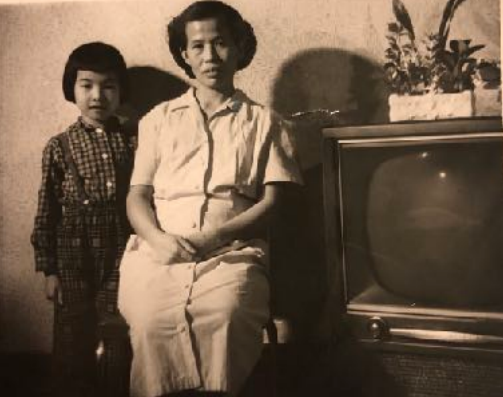
In the evenings, MaMa leaned out of the bedroom window facing Hudson Street, calling, “Ah-Hing, hek fan la!” That is me, Hing. I answered to “Cynthia” sometimes, and “Hing” at other times. It was part of my Life of Two Realities. When MaMa called, I rushed home, knowing that she cooked my favorite foods: steamed custard eggs with straw mushroom and oyster sauce drizzled on top, or beef and tomatoes with black bean and garlic sauce, or beef and bok choy with oyster sauce and a fried egg on top, the yolk oozing down into the rice and covering everything with its delicious, rich egg-ness. She sat with me at the square red formica table my father had rescued from a restaurant renovation, and she ate with me and talked with me and gave me advice about Life.
She told me stories about “Aw Kee”, her home. I kinda thought 116 Hudson Street was “Aw Kee” but I knew in My Life of Two Realities, she didn’t mean this Home when she said “Aw Kee”. I did not contradict her. MaMa told me about her mother and her father, how her father was a happy-go-lucky peddler with a feather in his hat and many friends, and how he refused to eat beef because the Ox plowed the earth for Mankind and how he refused to eat dog meat because dogs had sense, and was a loyal friend of Humanity, and how a lightning bolt struck him and killed him one day. She told me about her mother who told the Matchmaker Lady, the “Moy Ngin Poh,” not to bother introducing any young men to her four daughters if the young men were from anywhere other than the Land of the Gold Mountain. “No young men from neighboring villages, nor Jufu, Southeast Asia, nor Nam Mee, South America, nor from Goo Ba, Cuba, her mother said. She did not want her daughters to be poor, like her who had married a happy -go-lucky peddler of needles and thread and then died on her from a lightning bolt. I looked at my MaMa and pictured my two Aunts and I said, “Her daughters have dark skin and are not so beautiful, so how could she be so picky?” If the Matchmaker tried to recommend a nice local boy, her mother said, “My daughters are too young to consider marriage. Come back another day.” If the Matchmaker asked about Daughter Number Three, her mother said, “She is not ready. She is still young. Her two older sisters are not married yet.” So MaMa, being Daughter Number Three, had to wait until the old age of eighteen to marry my father. She told me how her second oldest sister came to check on her regularly after her marriage to my Dad, to make sure her new family of three teenage sisters-in-law and a bossy mother-in-law, rich with American money, did not pick on her poor little sister and how her second oldest sister said, “How dare they pick on my little sister when the groom is so unworthy of her, such an unrefined, clumsy boy?”
“Unrefined? ” “Clumsy?” “My Dad?” I adored my Dad.
However, there was one story MaMa never told me. It was about how my father traveled to Boston with his father and uncles as his uncle’s paper son to work in his uncle’s laundry and go to school when he was twelve years old. About how he became a bugler in the Italian North End Boy Scouts, about how he ran through the streets of the neighborhood of Sicilian fishermen, and how much he loved American movie stars, American music, and American culture, even though they never bought him a bed to sleep in, because they were Not Going To Stay in a Land Where They Were Not Wanted. Instead, he slept on the ironing table in the close quarters, and ironed with his own monogrammed brass blow sprayer after school hours until the age of eighteen, when his mother summoned him back home to China. He was becoming too western, too barbaric, his Taishanese showing an awkward American accent. No, MaMa did not tell me that story. About how his mother’s solution to the problem of his growing barbaric Western ways was, “You are eighteen. It is time for you to take a wife. We need to find you a nice Chinese Village Girl to marry.” How he said, “Alright, if you say so, but the girl must be tall and must be literate because I don’t like short girls, and she has to be able to read and write letters to America because I have to leave soon.” She did not tell me how the Matchmaker Lady arranged for him and his uncle to stand on a particular street corner to see a girl with long, thick braids walk by with her married second sister, how he and his uncle checked her out for a wife, how reluctant, but easy going, a son he was. How his uncle said, to him, “With a beautiful braid like that, what more do you want?” About how careful and vain she was about her beautiful, thick, black hair, and about the pride she took in her meticulous, colorful needlework, in her neat appearance, and about growing up in her family of four girls. MaMa did not tell me about that. About how my dad said, “Yes, she is fine.” when his mother asked him what he thought of the girl, and how she said to him, “You like her? You know, she is a bit on the old side. She is eighteen years old and her skin is a bit dark.” And how he answered, “No, she is fine. She is just fine, ” he said. About how they married at eighteen and how shy and scared she was with him on their first night, and how he left within a year because his papers were due, leaving her with child. No, she never told me that story. About how he returned six years later and they had a second girl and how his mother was not happy with her for having only girls. And how the wife of his younger brother made fun of her and said, “Whoever heard of a woman, like you, only birthing girls, unable to bear sons?” And how he left her with child again, and how she had a third girl. And how that third girl died of a high fever while he was away. She never talked about that. Not even to him. Not to anyone.
About how she survived the Japanese bombing and starvation by hiding in the village with her two daughters, digging for wild sweet potatoes and wild taro, and selling rice by walking all day with her twelve year old daughter from one village with rice to another without rice, about how she told her twelve year old daughter to walk slowly if the sack of rice felt too heavy on her young shoulders. About how she recycled clothing by using the good parts of her dead sister-in-laws’s dowry clothes, still in its hope chest, to redesign new clothing to sell at the vendor stalls. About how she walked a full day to the seashore to buy the salted fish brine from the fishermen to flavor and add nutrition to their watery rice gruel because she only had pennies to spend, while my father was an American soldier in Germany and France, and his pay could not arrive. And about how she did not see him again for fifteen years.
All this, she never told me.
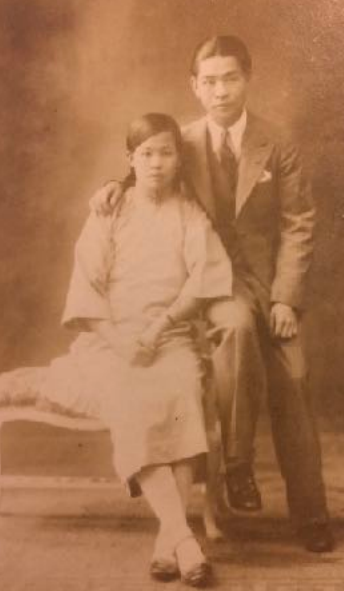
MaMa told me how obedient my older sisters in China were, how helpful they were to their Aunts, and how my oldest sister woke up before dawn to water the vegetables. I thought to myself, “I probably would not do that, even if I had vegetables to water here in snowy Boston.” I didn’t mention this to her because I knew she would just say with a sigh, “Ahh…Yes, you are lazy, not like your oldest sister, who was loved by all the Aunties in China.” Even though MaMa always smiled when she said this, I didn’t mention it. I knew she was proud of me, her American born daughter, who never had to water vegetables at the crack of Dawn. Even though she never said so, I knew she loved me and was proud of me.
The phone rang and I picked it up. I knew it was my Dad calling me, like he did every evening, from the Cathay House. He was unusual, different from the other Chinatown dads, in that way, and in one other, even more important way, he always spoke fluent English to me. It was a code I used that I knew MaMa didn’t understand.
“How are you?”
“Fine.”
“Did you eat dinner?”
“Yes.”
“What did you eat?”
“I ate beef and tomatoes and steamed eggs.”
“What are you doing? “
“Watching T.V.”
“How was your day? “
“It was good.”
“How was school?”
“It was good.”
“Did you finish your homework?”
“Yes. Your wife is annoying me.”
“Just ignore her. She’s your Mother. She will always be your Mother. When you are fifty, she will be ninety and she will still talk the same way to you. Just don’t mind her.”
Sigh. “Okay, Dad.”
“Goodnight, Cynthia, I love you.”
“Love you, too, Dad.”
“Sleep tight. Sweet dreams.”
“Yes, Dad. Goodnight, Dad.”
I never doubted that my busy parents loved me with all their hearts and did the best they could to take care of their American child.
Rrrrrrr…rrrrr..…Rrrrrrrrrr….rrrrrrr…rrrrrrrrrrrr……….I hung up the phone and looked out at the darkening sky and the sliver of moon, and I wondered if my two sisters in China were waking up, at that very moment, to water the vegetables. My dad, my MaMa, my sisters and I, were together and alone, all at the same time. We were a family, each of us breathing in and out, spinning in four different orbs of the Universe.
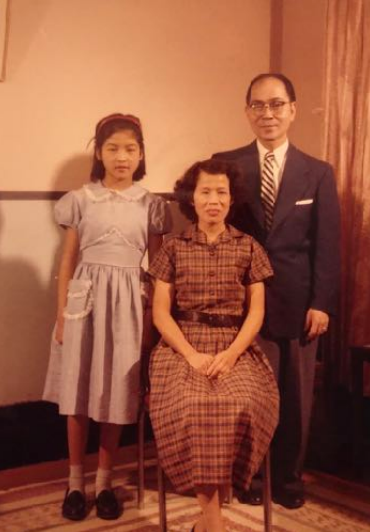
Gee and Walter Yee, 116 Hudson Street, 1959. Photo credit: taken by my uncle Eddie Moon-Fun Yee
The original version of “Sky” was published in the Asian American Resource Workshop Writers Group collection, “Asian Voices from BeanTown” in 2012. Cynthia Yee was the original founder and facilitator of the AARW Writers Group. She did a reading of the original version at the Annual Banquet Meeting of the Chinese Historical Society of New England in 2016 and also at the 2016 Bodega Signs+Wonders Poetry Block Party, at the urging of Denise Delgado, her GrubStreet teacher and Lead Artist for Bodega Signs+Wonders, a public art/oral history project in Egleston Square. Cynthia is grateful to her ever dependable cheerleader, Denise Delgado, for giving her the opportunity to read her work,“Tien Yi” at the 2016 GrubStreet Open House as well. Cynthia says, “Thank you, Denise, for the voice that always answers whenever I call out into the internet universe for literary advice. Thank you for friendship and all things.”
Cynthia dedicates this revised 2018 version to the Taishanese immigrant women stitchers, the Mothers of her Boston Chinatown childhood, and to the Left Behind Daughters, whose births provided the slots for paper sons to enter America during the Chinese Exclusion Act of 1882-1943. It was the first federal law implemented to prevent a specific ethnic group from immigrating to the United States of America. It barred paths to citizenship and intermarriage. The reverberations of that exclusionary law continued to affect and fracture Chinese American families for four generations.
Cynthia thanks her former GrubStreet teacher, and dear friend, Stacy Mattingly, for insisting on walking down Hudson Street with her on a rainy Sunday afternoon, asking her the locations of her former Chinatown home and neighborhood, for her courage in crossing borders of Time, Culture, and Place. Stacy’s abiding sensitivity, and compassionate interest in the human predicament, all helped midwife the birth of Cynthia’s 2018 revisions into stories of greater depth. Cynthia says, “Thank you, Stacy, for friendship, for kindness, for teaching me that Story is an Art. Thank you for your support, reading pieces before publication, cheering me on, and sharing my work among your circles, with enthusiasm.”
Cynthia Yee is an American born daughter of mud, silt, and water, a daughter of the Pearl River Delta and of migration, and all that that implies.
Dear Cynthia – I’ve just finished reading “Sky” and still feel deeply moved by this beautifully rendered passage from your childhood, so sensitively and skillfully conveyed. I can’t wait to read more of your writing and am absolutely delighted that other examples of your work are included. Your talent deserves to be shared with a vast audience.
With my thanks,
Judith Rosenmeier
LikeLiked by 1 person
Thank you for reading my work and commenting with such praise , Judith! It was nice seeing you at the Pao Arts Center event today.
LikeLike
And I was very pleased to meet you! May you thrive and flourish!
Judith
LikeLiked by 1 person
And you likewise !
LikeLike
You should read BaBa with Sky they are companion pieces .
LikeLike
As soon as I could (after 2 a.m. this morning) I did read “BaBa” and again was moved by the power and sensitivity of your writing. A marvelous link with “MaMa.” Despite the hour I couldn’t resist reading the other two pieces: also wonderful in their distinctly different ways. Your autobiographical notes are just overwhelming. I hope you are finding time to stitch together a longer memoir / autobiographical piece! I’d also be pleased if I could access more of your work, regardless of the genre. Cynthia, “thank you” doesn’t express how grateful I feel after reading your writing.
LikeLiked by 1 person
I am overwhelmed at the magnitude of your heartfelt praise ! Thank you Judith so very much for reading my work and enjoying them so much ! I have more pieces awaiting my revision attention but your warm praise makes me think I should get to them soon. You propel me on ! Thank you!
LikeLike
I’m the one giving thanks. Thank you for sharing the overflowing riches of your insight, observations, sensitivity, and creativity. Do devote yourself to finishing what is unfinished and opening yourself to what is new – but don’t hurry. Take the time you need, and know that I’m just one of your readers who will welcome what you write whenever you feel ready to let it let it fly through space!
Judith
LikeLiked by 1 person
Dear Judith I hope you see the new story I just posted “No Secret “ and I hope you enjoy it. Thank you for reading my work.
LikeLike
Thank you so much , Judith !
LikeLike